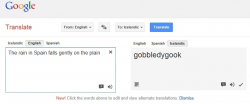According to a recent survey conducted by the Association of Translation Companies (ATC), the translation industry has an estimated annual worth of £1 billion in the UK alone; so why are some aspects of the actual process of translation still unclear to the general public? In light of this question, we thought that it would be useful to compile a list of the main misconceptions surrounding translation, and to reveal the reality behind them.
Misconception #1: Machine translation is the future, and soon there will be no need for human translators
Not true! This misconception is mainly due to recent news coverage. Google translate, new start-up businesses, portable translation technology you can now wear in your ears….. It’s hard to keep track of all this! The main selling point of machine translation is that it is fast and free (or at least very cheap). However, it is believed that machine translation is in fact fuelling the ever-increasing need for translation as it is more accessible to the general public; machine translation can potentially be useful for small pieces of work which can serve as a way of making the average person aware of translation, but information needs a human touch in order to create a lasting impact. Machine translation makes up a tiny percentage of the entire market, and the human translator’s ability to capture the subtle nuances and the in-depth hidden meaning of a language is irreplaceable.
Misconception #2: Being bilingual is the only skill translators need
Not at all! A solid knowledge of the source language and a mother tongue- level ability of the target language is essential for a successful translator, but so is (to name but a few!): an extensive knowledge of the source and target cultures, an expertise in at least one specialised area of translation which often requires additional qualifications, excellent writing skills in many areas of text types, styles, and genres, and the ability to distinguish between different writing tones and subtleties in the source language and to convey them effectively into the target language… Oh, and it also requires excellent computer skills when dealing with a variety of file types and very efficient time- management and research skills!
Misconception #3: Only “officials” and those in advertising need translation services
Wrong! We’ve all seen the television footage from international events or debates, in which delegates and officials swap messages via interpreters hidden away in their little booths. Likewise, we’ve all seen posters or adverts in other countries which look exactly like the ads we have seen before in our home countries, except they are in another language. While translation is very important for international officials and advertising companies, it is just as important for individuals and other businesses. Businesses employing foreign workers or selling abroad, Universities and colleges, as well as solicitors and doctors with foreign clients and patients, for example, will all just as likely need translation services.
Misconception #4: Translation is simply the process of replacing one word in one language with its equivalent in another language
Incorrect! No two languages are identical, in terms of the words they use (obviously!) but also in terms of their word order, their cultural references, their alphabet… Even a small piece of text is unlikely to produce a word for word translation, as many words and phrases do not have direct translations into another language. And let’s not forget the difficulties in translating jokes, catchphrases, colloquialisms, poems, song lyrics…
Misconception #5: Translation is a very quick, near simultaneous process
Not (exactly) true! The speed of the translation can depend on the technicalities of the content, the intricacies of the language pair and of course the translator’s natural speed of working. Translators on average can produce between approximately 1,500- 3,000 words of translated text per day; this includes the time spent on any necessary background research, formatting the document, proofreading it and ironing out any confusions… With all this to consider, we can be sure that the process of translation is as quick and as efficient as it can possibly be, and in the end we receive a quality piece of work that is well worth the wait.
Can you think of anymore translation “facts” that we can prove as myths or misconceptions? Find us on Facebook and Twitter and share your story with us.





